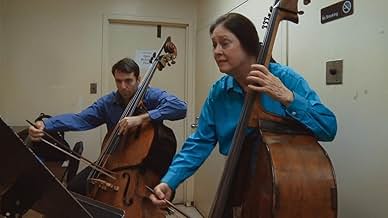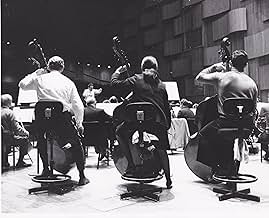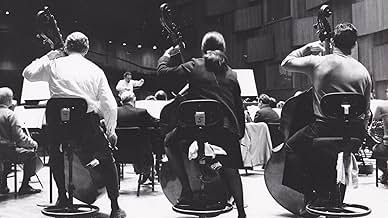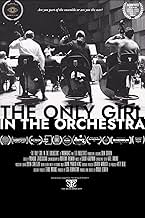IMDb-BEWERTUNG
6,6/10
2767
IHRE BEWERTUNG
Diese unbesungene Heldengeschichte feiert die bahnbrechende Musikerin Orin O'Brien und ihren Kontrabass.Diese unbesungene Heldengeschichte feiert die bahnbrechende Musikerin Orin O'Brien und ihren Kontrabass.Diese unbesungene Heldengeschichte feiert die bahnbrechende Musikerin Orin O'Brien und ihren Kontrabass.
- 1 Oscar gewonnen
- 3 Gewinne & 1 Nominierung insgesamt
Empfohlene Bewertungen
In "The Only Girl in the Orchestra", the audience is taken on a cinematic journey that goes beyond the conventions of a typical documentary. More than just telling the story of Orin O'Brien, one of the most important figures in the classical music world, the film reveals, layer by layer, the depth of her journey, from her roots in Hollywood to her prominent position in the New York Philharmonic. Directed by Molly O'Brien, the documentary creates a narrative that is both a celebration of a life dedicated to music and an ode to the persistence and cultural legacy of a pioneering woman in a field historically dominated by men.
The structure of the film is like a musical piece, with each segment being a vital part of the whole, with its own rhythms and tempos. The way Orin's story is told is like a carefully orchestrated composition, where the development is slow but rewarding, following the growth of her career and personality. The filmmaker subtly and effectively leads the audience while unveiling the many facets of Orin: the young prodigy, the woman ahead of her time, and the educator with a generous heart. There's no rush, and the patience with which the stories of her life are explored reflects the same serenity of a concert performance.
The greatest strength of the documentary lies in how it humanizes Orin. Her skill with the double bass, which would alone be enough to secure her place in history, is treated with respect and reverence, but what really makes the film special is how she dedicates herself to the art of teaching. The film delves into the importance of Orin as an educator, her devotion to cultivating the next generation of musicians, and her commitment to showcasing the beauty of collaboration within music. This pedagogical aspect isn't treated superficially; it's a central pillar of the narrative, showing that Orin's legacy extends beyond the stage and impacts future generations, making music an experience that transcends individual performance.
What stands out in "The Only Girl in the Orchestra" is the way it sensitively and seamlessly integrates Orin's reflections on her journey. Her words, full of wisdom and experience, are like solos that slowly intertwine with images of her work with students at Juilliard and in other musical settings. The film, by capturing these nuances, does an excellent job of exposing the importance of music education as an extension of the art itself. Music isn't just a technique; it's a philosophy of life that Orin shares with her students and the audience.
Molly's direction shines in the way she maintains a warm and respectful tone throughout the film. There are no excesses, nor lack of depth. Each moment is given the necessary time to be felt. The soft lighting and the carefully planned aesthetic create an intimate atmosphere, making the audience feel close to Orin, as if they are watching a private conversation between her and the camera. It's a film that, while dealing with great achievements on a global stage, never loses its personal, sometimes even vulnerable, character.
Overall, "The Only Girl in the Orchestra" is much more than a documentary about an exceptional musician. It's a tribute to perseverance, the importance of education, and, above all, the transformative power of music. The narrative goes beyond expectations, and like any great composition, it resonates with the audience's emotions long after it ends. The film reminds us that the true greatness of a person lies in how they inspire others, whether through music or by example.
The structure of the film is like a musical piece, with each segment being a vital part of the whole, with its own rhythms and tempos. The way Orin's story is told is like a carefully orchestrated composition, where the development is slow but rewarding, following the growth of her career and personality. The filmmaker subtly and effectively leads the audience while unveiling the many facets of Orin: the young prodigy, the woman ahead of her time, and the educator with a generous heart. There's no rush, and the patience with which the stories of her life are explored reflects the same serenity of a concert performance.
The greatest strength of the documentary lies in how it humanizes Orin. Her skill with the double bass, which would alone be enough to secure her place in history, is treated with respect and reverence, but what really makes the film special is how she dedicates herself to the art of teaching. The film delves into the importance of Orin as an educator, her devotion to cultivating the next generation of musicians, and her commitment to showcasing the beauty of collaboration within music. This pedagogical aspect isn't treated superficially; it's a central pillar of the narrative, showing that Orin's legacy extends beyond the stage and impacts future generations, making music an experience that transcends individual performance.
What stands out in "The Only Girl in the Orchestra" is the way it sensitively and seamlessly integrates Orin's reflections on her journey. Her words, full of wisdom and experience, are like solos that slowly intertwine with images of her work with students at Juilliard and in other musical settings. The film, by capturing these nuances, does an excellent job of exposing the importance of music education as an extension of the art itself. Music isn't just a technique; it's a philosophy of life that Orin shares with her students and the audience.
Molly's direction shines in the way she maintains a warm and respectful tone throughout the film. There are no excesses, nor lack of depth. Each moment is given the necessary time to be felt. The soft lighting and the carefully planned aesthetic create an intimate atmosphere, making the audience feel close to Orin, as if they are watching a private conversation between her and the camera. It's a film that, while dealing with great achievements on a global stage, never loses its personal, sometimes even vulnerable, character.
Overall, "The Only Girl in the Orchestra" is much more than a documentary about an exceptional musician. It's a tribute to perseverance, the importance of education, and, above all, the transformative power of music. The narrative goes beyond expectations, and like any great composition, it resonates with the audience's emotions long after it ends. The film reminds us that the true greatness of a person lies in how they inspire others, whether through music or by example.
...but it still won an Oscar!
Orin's achievements are amazing, but the doco is meandering and wastes its half hour running time. We learnt more about her parents and the director (her niece) than the woman in the title. Some wonderful moments in there, but too few and far between. Her phenomenal talent and legacy were glossed over. Worth watching, but you're left wanting more of Orin and less of the elements surrounding her. And how many times were people talking over the top of each other? Orin and her niece were the worse offenders. Some variety in the soundtrack would have been nice as well. Such a compelling subject not given its due.
Orin's achievements are amazing, but the doco is meandering and wastes its half hour running time. We learnt more about her parents and the director (her niece) than the woman in the title. Some wonderful moments in there, but too few and far between. Her phenomenal talent and legacy were glossed over. Worth watching, but you're left wanting more of Orin and less of the elements surrounding her. And how many times were people talking over the top of each other? Orin and her niece were the worse offenders. Some variety in the soundtrack would have been nice as well. Such a compelling subject not given its due.
I had never heard of Orin O'Brien before watching the Academy Award-winning documentary "The Only Girl in the Orchestra", directed by her niece Molly. Born to actors, Orin O'Brien decided that she wanted to go into music, and eventually joined the New York Philharmonic, the first woman to do so.
The documentary focuses mainly on her retirement, leaving lots of questions about her career, and I would like to know more about that. As to the issue of whether or not it deserved its Oscar win, I haven't seen any of the other nominees, so I'm not at liberty to say. What I can say is that it's interesting to learn about this woman, and her path from Hollywood child to accomplished musician. Worth seeing.
The documentary focuses mainly on her retirement, leaving lots of questions about her career, and I would like to know more about that. As to the issue of whether or not it deserved its Oscar win, I haven't seen any of the other nominees, so I'm not at liberty to say. What I can say is that it's interesting to learn about this woman, and her path from Hollywood child to accomplished musician. Worth seeing.
Road to the Oscars 2025: This is nominated for 1 Oscar and it´s best documentary short.
What do you do when your job ends? A question asked to Orin O'Brien a very interesting character to interview for the simple reason she doesn't really wants to be here. It´s fascinating how the documentary wants to be political but is shot down by its own subject matter that does not see herself as anything significant even though the world did. That is the blessing and the curse of this documentary. It´s subject matter is interesting but is never fully developed by the nature of the protagonist of our story here.
Orin O´Brien, the first female to be in the New York Philamonic reflects on her carrier as she is retiring.
Orin is an interesting and fun person. She can seem a bit out of it at times and a bit collected and calm yet not. An accept that I love about her and the aspect that ruins the nature of the documentary is that the documentary wants to make her important but she herself doesn't see herself as important. She is just another musician in a band, and without the others in her band she would be nothing. The world wanted her to be more important, first girl in the band, she has nepo parents, but to her she was none of that and that makes her so cool, yet it takes away the significance of the story told, as we are told, yup, this person was just anyone. It is a nature that conflicts with itself and creates a mess of a doc.
Because what now? This is a goodbye doc, to a woman I just got to know and since she says herself she is not important or special, what am I supposed to do with that? It creates a celebration of a person that is in her own words not important and that just makes the doc seem less important. Everyone says she´s important but our lead tells you to not bother.
The score under this is lovely, highlighting the bass music O´Brien must have played through her career.
The doc wants to be political but fails at it by the nature of O´Brien. It wants to say that was slander about her, that her parents was famous and she wanted nothing of it, but it seems like O´Brien isn´t really that interested in talking about that and more about her just retiring more than anything and the feelings that comes with that.
This is a fine enough doc with a fun lead to follow, but it´s weird nature and conflicting ideas creates a bit of a mess in my option.
Oscar predictions: This might have a chance to win for the simple reasons it´s made by a major studio in form of Netflix(although the Oscars notoriously hates Netflix wins) and that Leonard Bernstein is mentioned a fresh in mind name for the academy since "Maestro"(2023) was a thing. Personally I liked both "Instruments of a beating heart"(2024) and "Incident"(2023) more and think they have more solid subject matter. Of the 3 I have watched I think "Incident" should win, but We´ll see if the academy is brave enough to let something like that win.
What do you do when your job ends? A question asked to Orin O'Brien a very interesting character to interview for the simple reason she doesn't really wants to be here. It´s fascinating how the documentary wants to be political but is shot down by its own subject matter that does not see herself as anything significant even though the world did. That is the blessing and the curse of this documentary. It´s subject matter is interesting but is never fully developed by the nature of the protagonist of our story here.
Orin O´Brien, the first female to be in the New York Philamonic reflects on her carrier as she is retiring.
Orin is an interesting and fun person. She can seem a bit out of it at times and a bit collected and calm yet not. An accept that I love about her and the aspect that ruins the nature of the documentary is that the documentary wants to make her important but she herself doesn't see herself as important. She is just another musician in a band, and without the others in her band she would be nothing. The world wanted her to be more important, first girl in the band, she has nepo parents, but to her she was none of that and that makes her so cool, yet it takes away the significance of the story told, as we are told, yup, this person was just anyone. It is a nature that conflicts with itself and creates a mess of a doc.
Because what now? This is a goodbye doc, to a woman I just got to know and since she says herself she is not important or special, what am I supposed to do with that? It creates a celebration of a person that is in her own words not important and that just makes the doc seem less important. Everyone says she´s important but our lead tells you to not bother.
The score under this is lovely, highlighting the bass music O´Brien must have played through her career.
The doc wants to be political but fails at it by the nature of O´Brien. It wants to say that was slander about her, that her parents was famous and she wanted nothing of it, but it seems like O´Brien isn´t really that interested in talking about that and more about her just retiring more than anything and the feelings that comes with that.
This is a fine enough doc with a fun lead to follow, but it´s weird nature and conflicting ideas creates a bit of a mess in my option.
Oscar predictions: This might have a chance to win for the simple reasons it´s made by a major studio in form of Netflix(although the Oscars notoriously hates Netflix wins) and that Leonard Bernstein is mentioned a fresh in mind name for the academy since "Maestro"(2023) was a thing. Personally I liked both "Instruments of a beating heart"(2024) and "Incident"(2023) more and think they have more solid subject matter. Of the 3 I have watched I think "Incident" should win, but We´ll see if the academy is brave enough to let something like that win.
Wusstest du schon
- WissenswertesDirected by Orin O'Brien's niece Molly O'Brien.
- Zitate
Orin O'Brien: I didn't have any ambition of being a soloist, I liked being in the background.
- VerbindungenFeatured in The Oscars (2025)
- SoundtracksSymphony No. 2 in C Minor 'Resurrection'
Written by Gustav Mahler (as Mahler)
Performed by The New York Philharmonic with Leonard Bernstein
Deutsche Grammophon, 1990
Top-Auswahl
Melde dich zum Bewerten an und greife auf die Watchlist für personalisierte Empfehlungen zu.
Details
- Erscheinungsdatum
- Herkunftsland
- Offizielle Standorte
- Sprache
- Auch bekannt als
- The Only Girl in the Orchestra
- Produktionsfirmen
- Weitere beteiligte Unternehmen bei IMDbPro anzeigen
- Laufzeit34 Minuten
- Farbe
Zu dieser Seite beitragen
Bearbeitung vorschlagen oder fehlenden Inhalt hinzufügen

Oberste Lücke
What is the French language plot outline for Die einzige Frau im Orchester (2023)?
Antwort


















